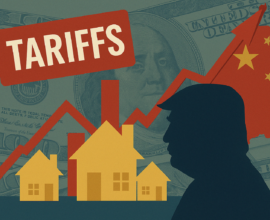How to Invest Based on 2024 Mortgage Rate Predictions
Real estate investors must consider many factors before putting money into a residential or commercial property. One of the biggest factors is the market’s mortgage rates, which have been sitting at around 7% for most of 2023. That number is expected to change in 2024, so investors need to adjust their plans accordingly. Here’s how your investing strategies could change based on predicted mortgage rates next year.
The economy’s resilience in the face of high costs should give investors confidence that it will continue to recover in 2024 and beyond.
The Current State of Mortgage Rates
Back in March 2022, the Federal Reserve raised interest rates for home loans by .25% for the first time since 2018. The Fed promised a maximum of six more moderate increases to compensate for inflation and get the economy back on track. This promise didn’t come to fruition, as the Fed has increased rates 11 more times in its last 12 meetings.
The most recent spike occurred in July 2023, bringing rates to a 22-year high. These are the average rates in the U.S. as of October 2023:
- 30-Year Fixed Rate: 7.80%, 7.82% APR (total cost of the loan)
- 20-Year Fixed Rate: 7.77%, 7.79% APR
- 15-Year Fixed Rate: 7.03%, 7.08% APR
- 10-Year Fixed Rate: 7.02%, 7.06% APR
- 5-1 ARM: 6.79%, 8.05% APR
- 10-1 ARM: 7.37%, 8.12% APR
- 30-Year Fixed Rate FHA: 6.91%, 7.84% APR
- 30-Year Fixed Rate VA: 7.14%, 7.26% APR
- 30-Year Fixed Rate Jumbo: 7.81%, 7.82% APR
Although these numbers are still higher than investors would like, mortgage rates are naturally trending lower as 2023 comes to a close. Several factors have contributed to this promising trend, including the start of the holiday season and a more optimistic change of tone from Fed representatives. These changes usually lead to more market activity and lower rates.
Right now, the Fed’s rate-setting committee is taking a wait-and-see approach to determine whether inflation will drop to their 2% target. Another spike would increase the risk of a deeper recession, so officials are hesitant to make any more sudden changes.
Focus on maximizing short-term investments until market conditions improve later in 2024.
Forecasting Mortgage Rates for 2024
Compared to the bleak mortgage rates from 2022 and 2023, the forecast for 2024 looks more hopeful than anticipated. Economists expect officials to start lowering rates early in the year now that the “tightening cycle has run its course,” in the words of Fed chairman Jerome Powell. The decrease might only be 1%, but that would be a great start to the year.
However, other economists — including those from Goldman Sachs and KPMG — believe the Fed won’t cut interest rates until May 2024 at the start of the second quarter. They made this prediction because the Fed prefers to see an entire quarter of lower inflation instead of singular months. This mentality is certainly in line with the Fed’s wait-and-see approach.
The latter half of 2024 is still too far off to make any definitive forecasts, but the American Bankers Association believes interest rates will decrease by 1% between May and December. Other organizations like the National Association of Realtors and Mortgage Bankers Association expect rates to reach 6% or lower by the end of the year.
In other encouraging news, the odds of a recession have dropped below 50% for the first time in 2023. The economy’s resilience in the face of high costs should give investors confidence that it will continue to recover in 2024 and beyond. It now seems unlikely that the Fed will wait until a full-blown recession to cut interest rates.
Implications for Investors
2024 is expected to look better for real estate investors than previous years.
Informed investors have already responded to the positive news, as mortgage applications are increasing week by week, except for certain adjustable-rate mortgages. This trend makes sense given that ARMs are still slightly higher than the fixed rates. However, diversification of investment portfolios is almost always a good idea.
Although fixed-rate mortgages will continue to offer more stability than ARMs, investors must keep their options open. As the market opens up, you should consider different types of residential and commercial properties, as well as unique geographical locations. Some places have more manageable prices than others, especially these thriving locations:
- Salt Lake City, Utah
- Las Vegas, Nevada
- Pittsburgh, Pennsylvania
- Columbus, Ohio
- Texas metropolitan areas, including Austin, Waco, and Wichita Falls
- Tennessee metropolitan areas, including Nashville, Clarksville, and Jackson
- Georgia metropolitan areas, including Atlanta, Athens, and Savannah
- Florida metropolitan areas. including Orlando, Jacksonville, and Fort Myers
- North Carolina metropolitan areas, including Charlotte, Raleigh, and Greensboro
Home prices are still up by 3% year-over-year, with about 4.3 million vacancies. Starter homes and listings in middle-income communities are selling the fastest, so investors are looking for deals despite the high costs. This market activity should ramp up if conditions improve as expected in 2024.
The forecast for commercial real estate, multi-family properties, and other rentals isn’t so clear. There is a growing demand for co-working spaces nationwide as more businesses adopt hybrid work models and try to cut operating costs. These spaces present intriguing opportunities for investors to collaborate and get high-value properties in growing cities.
Commercial real estate loans haven’t performed well by any metric in 2023, but banks are still loaning out more money than in 2021 and 2022. If the Fed lowers interest rates as forecasted and more people return to in-person work, office buildings and other commercial workspaces will become more attractive.
Additionally, you should prioritize commercial properties with shorter lease terms. Long-term investments are usually preferred but not in this economic climate. You don’t want to get caught in a bad investment while the economy is still recovering. Focus on maximizing short-term investments until market conditions improve later in 2024.
Real estate investment trusts (REITs) should also be on everyone’s investment radar in 2024. Unlike traditional investments, REITs enable you to hedge against inflation and create a solid income stream from the property despite high inflation. They can give you a small but lucrative stake in any type of property you wish to pursue.
2024 Looks Better Than Previous Years
In summary, 2024 is expected to look better for real estate investors than previous years. The Fed will lower interest rates in May at the latest, and they could dip below 6% by the end of the year. If this prediction happens, housing markets will open up, and commercial real estate will also perform better. Nothing is certain in this economy, but things are looking up.








